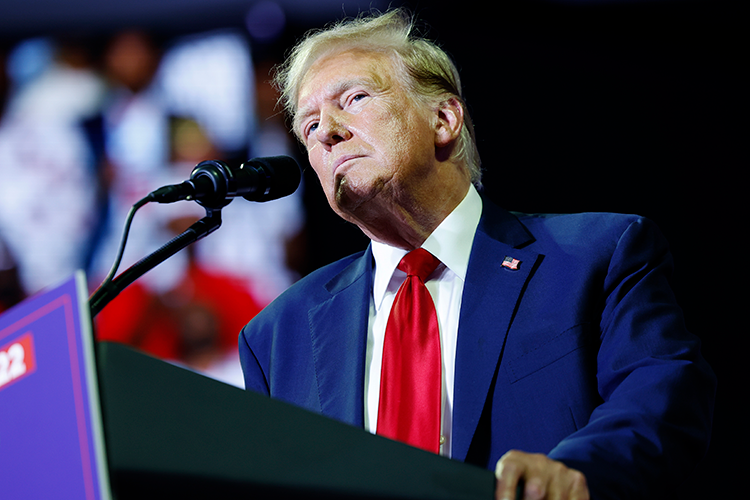Former presidents have 'absolute immunity' for official acts, says SCOTUS in 6-3 decision

Special counsel Jack Smith has charged Donald Trump with four felonies connected to his alleged plan to stay in power after Joe Biden’s 2020 presidential victory. (Photo by Anna Moneymaker/Getty Images)
Former presidents are immune from prosecution for official actions taken while in the White House, the Supreme Court ruled on Monday, but do not have immunity for unofficial acts.
The 6-3 ruling along ideological lines likely means that Donald Trump’s federal trial could proceed in D.C., but only after additional delay.
The justices sent the case back to the lower court to determine which acts alleged in the indictment are official. That makes it highly unlikely that the 45th president will go to trial on charges of trying to subvert the 2020 election before voters cast ballots in this year’s presidential contest, in which Trump is the presumptive Republican nominee.
See also: Statement of ABA President Mary Smith RE: Supreme Court ruling in Trump v. United States
Trump became the first former U.S. president to be convicted of a crime in an unrelated New York case in May. He has tried to push his three remaining criminal trials until after the November election, raising the prospect that if he is reelected, he could press the Justice Department to drop the federal charges against him once he takes office.
The justices’ decision to hear Trump’s unprecedented immunity claims—rather than let stand a unanimous appeals court decision that had denied immunity and greenlighted Trump’s prosecution—effectively halted all preparations for the D.C. federal trial, which originally was set to start March 4.
Special counsel Jack Smith has charged Trump with four felonies connected to his alleged plan to stay in power after Joe Biden’s 2020 presidential victory: conspiring to defraud the United States, conspiring to obstruct the formal certification of Biden’s win in Congress on Jan. 6, 2021, obstructing a congressional proceeding, and conspiracy against rights—in this case, the right to vote.
Trump challenged the D.C. indictment, saying former presidents are immune from criminal prosecution, at least for actions related to their official duties, unless first impeached and convicted by Congress. During oral argument, Trump’s lawyer, D. John Sauer, acknowledged that the former president could be prosecuted for private acts while in office.
A three-judge panel of the U.S. Court of Appeals for the D.C. Circuit said forcefully and unanimously that Trump could be prosecuted for his alleged efforts to disrupt the election results. That is the ruling that was reviewed by the Supreme Court.
Trump is accused of using false claims of massive voter fraud to pressure state officials, the Justice Department and former vice president Mike Pence to change the election results; scheming with others to submit to Congress slates of phony electors from swing states and to get lawmakers to toss out lawful ballots; and encouraging supporters to gather at the Capitol, where a violent mob stopped the vote count for many hours.
There were not many cases from history for the justices to turn to for guidance to resolve the competing claims in Trump v. United States. Forty years ago, in a case involving President Richard M. Nixon, the Supreme Court said the Constitution shields presidents from private civil lawsuits for actions taken as part of their official duties—even those at the “outer perimeter” of their responsibilities.
That decision aimed to ensure the threat of civil litigation did not distract from a president’s duties. But it did not address criminal liability.
After the D.C. Circuit ruling, written jointly by judges nominated by presidents of both parties, it took almost two weeks for the Supreme Court to announce in late February that it would review the immunity case. The justices scheduled oral argument for late April, making it unlikely that a decision would come before the final days of the term. The decision to hear the case, and the timing of how the justices did it, was assailed by Trump’s critics, who say the American public should know the outcome of the D.C. trial before casting ballots for the next president in November.
When they decided to take the case, the justices rephrased the question they would consider to address “whether and if so to what extent does a former president enjoy presidential immunity from criminal prosecution for conduct alleged to involve official acts during his tenure in office.”
At oral argument, many justices seemed interested in how to distinguish between a president’s actions that are private and those that are part of official duties—and therefore may be protected by some level of immunity.
Last updated at 9:57 a.m.



